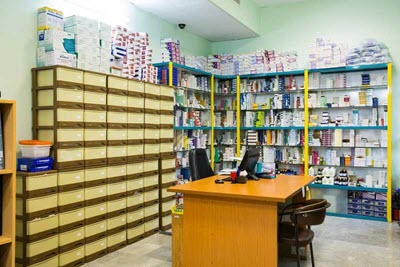Pharmacy
Home Pharmacy

Charter of patient rights in the pharmacy
In order to determine the rights of patients in pharmaceutical institutions and improve the quality of services, as well as in order to improve community health indicators and implement Article 1 of the Law on the establishment of the Ministry of Health, Treatment and Medical Education and Article 2 of the Law related to the regulations of medical affairs, pharmaceuticals, edibles and Beverages approved by the Islamic Council and related regulations are hereby notified of the patient's rights charter in the pharmacy as follows.
- The patient has the right to inquire about the necessary information regarding their medication from the pharmacist at the pharmacy (including the dosage and proper usage of the medication), and the pharmacist is obliged to provide comprehensive explanations to all medication-related questions the patient may have. The information provided should be clear and free of technical terms, ensuring the patient's complete understanding and satisfaction. Additionally, the pharmacist must dispense the medication dosage and usage according to the guidelines outlined in directive number 739/D, dated 5/2/80.
- The patient has the right to preserve their dignity and respect at the pharmacy, and their pharmaceutical needs should be addressed promptly and fully while adhering to regulations and standards.
- They also have the right to trust the pharmacist with the confidentiality of their illness and health status, and the pharmacist should provide assurance to patients in their professional interactions.
- The patient has the right to seek guidance and consultation from the pharmacist at the pharmacy regarding the medications prescribed by their physician.
- They have the right to ensure that the pharmacist's responses meet their medication needs, and the pharmacist is responsible for their statements and recommendations.
- The patient has the right to request information from their pharmacist about the benefits, risks, and costs of their medication, and the pharmacist should guide the patient accordingly.
- They also have the right to know what to do if they forget a dose of medication and how to recognize the effectiveness of their prescribed medications and signs of treatment progress.
- Depending on the patient's level of awareness and, if applicable, their medical background, the pharmacist can provide additional information.
- They should also advise on potential drug interactions with food, other medications, and the patient's laboratory test results.
- If necessary, the pharmacist should provide recommendations for medication use during pregnancy or lactation and guide the patient on the concurrent use of medications (OTC medications, oral contraceptives, etc.).
- The pharmacist should recommend how to use the available medications in the prescription for patients with underlying medical conditions.
- They should review the prescribed dosage based on the patient's conditions (age, weight, etc.) and consult with the treating physician if necessary.
- The pharmacist should warn about significant side effects of the medication in accordance with the patient information leaflet, considering the patient's conditions.
Description of the duties of the technical manager of the pharmacy
- Designing, developing, implementing, and updating the hospital's pharmaceutical care system.
- Supervising and controlling the processes of procurement, distribution, and storage of drugs and medical supplies.
- Monitoring the prescribing and use of drugs and medical supplies to ensure the safety and quality of services provided to patients.
- Providing educational and research services in the field of pharmaceutical care.
- Implementing, directing, and guiding the pharmaceutical care system at the hospital level.
- Performing all necessary planning, organizing, and follow-ups for providing supervisory, advisory, informational, and control services in the field of pharmaceutical care, including monitoring drug procurement and storage in terms of quantity and quality.
- Conducting inspections, coordination, and necessary follow-ups to implement all organizational and managerial procedures for pharmaceutical information dissemination and poisoning control in the hospital.
- Coordinating and following up to establish, activate, and form a drug therapy committee to provide input for general and specific drug decisions in this committee and to support and participate in formulating and updating the hospital formulary.
- Receiving guidelines on the distribution, completion, collection, and submission of adverse drug reaction (ADR) reporting forms and planning and monitoring the implementation of these guidelines and sending forms to the ADR registration and review center.
- Providing specialized consultation to medical and hospital staff.
- Reviewing and scientifically monitoring the drug records of hospitalized patients to observe scientific principles in rational drug prescribing and usage of drugs, equipment, and consumables.
- Regular inspections of the warehouse, resuscitation trolley, and other drug storage areas to ensure compliance with technical and scientific principles.
- Observing ethical and professional principles in assigned tasks.
- Participating in drug and therapy committee meetings.
- Presenting plans, proposals, and corrective suggestions to optimize pharmaceutical service operations.
- Preparing an initial list of pharmaceutical drugs for presentation to the drug and therapy committee.
- Providing necessary drug instructions and guidelines to patients.
- Preparing prescriptions and documents for submission to rational drug prescribing and usage sub-committees.
- Controlling and supervising the conditions and technical principles of pharmaceutical warehousing.
- Performing innovative pharmaceutical services during patient admission and discharge by the hospital pharmacist.
Dear patients, if you need drug information, please call 02144723330 extension 216 from 09:00 AM to 15:00 PM.

